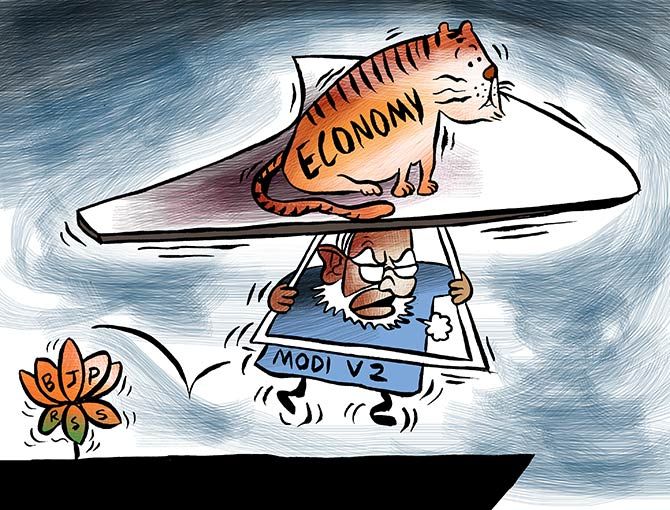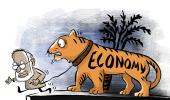'There are deliberations on whether there can be lowering of income taxes and other sops to keep more money in the hands of taxpayers, enabling them to spend more and boost demand.'
Arup Roychoudhury and Indivjal Dhasmana report.

Faced with warning signs of an economic slowdown, the finance ministry has prepared a three-pronged strategy to boost consumption as well as bring down the cost of capital to ensure higher private investment.
One of them is to lower income tax rates, enabling the middle and neo-middle classes to spend more, which will boost demand and consumption.
Secondly, there will be a continued public sector investment push, which will act as a stimulus to private investment.
The third is to lower the cost of borrowing, which will enable corporate to borrow more and spend it on investment.
Some of these measures are expected to find their way into the full Budget 2019-2020.
The government will have to do its fiscal math to provide this kind of boost if it wants to stick to the fiscal deficit target of 3.2% of gross domestic product for the current financial year.
The last measure will be subject to the Reserve Bank of India's Monetary Policy Committee's move to reduce the policy rate in its June review.
Senior government officials hope that inflation trends are benign enough to justify another round of rate cuts by the MPC to perk up economic growth, which is unlikely to go much higher than the anticipated 7% in FY19.
"What we won't do is have a 2009-2010 kind of stimulus, by pumping in more money to boost growth. There is no fiscal space to do that. The Modi government will continue its fiscal consolidation path," said an official aware of the plans.
The government had then given over Rs 1 trillion stimulus to spur economic growth, which saw the ripple effects of the global financial meltdown. It had also cut excise duties and services tax, besides enhancing public expenditure.
However, now excise duties and services tax have largely been subsumed into the goods and services tax, where the Centre alone cannot take any decision. So, stimulus has to come from the income tax front.
"There are deliberations on whether there can be lowering of income taxes and other sops to keep more money in the hands of taxpayers, enabling them to spend more and boost demand. Of course, any such measure will be announced in the Budget. We will present this proposal to the new finance minister," said the official.
The interim Budget for FY20 has already announced tax credits because of which taxable income of up to Rs 5 lakh would not draw any tax. This means gross income of up to Rs 10 lakh depending on various savings done under tax deduction schemes.












 © 2025
© 2025